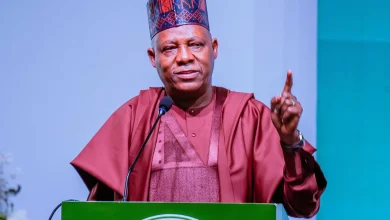
The Edo State Internal Revenue Service (EIRS) says the state has recorded N79 billion in Internally Generated Revenue (IGR) so far this year.
Executive Chairman of EIRS, Mr. Oladele Bankole-Balogun, disclosed this during a high-level meeting with heads of MDAs, permanent secretaries, and directors in Benin on Tuesday.
Mr. Bankole-Balogun, warned, however, that leakages by Ministries, Departments, and Agencies (MDAs) pose a threat to sustainable growth.
According to him, “N52.6 billion of the total was raised in the first half of 2025, representing a 46 per cent increase over previous periods.
“These results are commendable. Yet, by the standards of the governor, the expectations of Edo people, and the possibilities before us, there is still much more to do,” he said.
Bankole-Balogun stressed the need to close leakages, comply fully with the Treasury Single Account (TSA), and align with the Nigerian Tax Reform Acts set to take effect Jan. 1, 2026.
He described revenue as the “lifeline of development”, insisting that Edo must position itself as a frontrunner in implementing the new framework.
“This meeting is more than administrative – it is a clarion call for unity, collaboration, and shared purpose in building the Edo State of our dreams.
“Revenue is not an end in itself; it is a means – a means to better roads, stronger health systems, vibrant education, safe communities, and dignity for all citizens of Edo State,” he said.
The chairman emphasised that every MDA must become “a revenue-generating asset in its own right”, while ensuring compliance with digital systems and TSA requirements.
“Going forward, we will insist that all revenue streams be remitted into the IGR account, with proper digital trails and accountability,” he added.
Bankole-Balogun highlighted the opportunities in the 2025 Nigerian Tax Reform Acts, which he said consolidated multiple tax laws into a unified Nigeria Tax Act (NTA).
He explained that the reforms broadened the tax base to include digital assets and informal commerce, introduced a 4 per cent development levy, and established new institutions, such as the Nigeria Revenue Service (NRS) and a Tax Ombudsman.
“The new framework simplifies, digitalises, and makes tax administration more predictable.
“Edo must align internal processes, adopt e-receipting and digital reporting, and leverage our informal and digital economy for sustainable growth,” he said.
He urged MDAs handling land, urban planning, permits, and business registrations to strengthen compliance under the restructured stamp duty and real estate provisions.
“Think of the untapped potential in land and planning agencies, in building control, in informal trade regulation, in permitting systems, and in new business registration,” he said.
Bankole-Balogun called for sustained partnership, saying, “we do not ask for compliance by fiat, but by reason, trust, systems, and partnership.
“We invite each of you to own the vision, to embed revenue-conscious thinking in your agencies, and to commit to the discipline that accountability demands.”
Meanwhile, Mr. Jackson Eribo, Executive Director of MDA Services, outlined challenges hindering revenue optimisation.
According to him, the issues include illegal opening of revenue accounts, cash collections against the state’s cashless policy, and partial remittances.
Other problems, he said, were fragmentation of systems outside the Edo Revenue Administration System (ERAS), and non-compliance with Tax Clearance Certificate (TCC) requirements.
“The continued violation of the state’s cashless policy through cash collections and partial remittances remains a serious concern,” Eribo warned.
Attorney General of the State, Mr. Samson Osagie, and other stakeholders at the meeting proposed joint strategies to block leakages and ensure seamless collaboration. () The Edo State Internal Revenue Service (EIRS) says the state has recorded N79 billion in Internally Generated Revenue (IGR) so far this year.
Mr Oladele Bankole-Balogun, Executive Chairman of EIRS, disclosed this during a high-level meeting with heads of MDAs, permanent secretaries, and directors in Benin on Tuesday.
He warned, however, that leakages by Ministries, Departments, and Agencies (MDAs) pose a threat to sustainable growth.
According to him, N52.6 billion of the total was raised in the first half of 2025, representing a 46 per cent increase over previous periods.
“These results are commendable. Yet, by the standards of the governor, the expectations of Edo people, and the possibilities before us, there is still much more to do,” he said.
Bankole-Balogun stressed the need to close leakages, comply fully with the Treasury Single Account (TSA), and align with the Nigerian Tax Reform Acts set to take effect Jan. 1, 2026.
He described revenue as the “lifeline of development”, insisting that Edo must position itself as a frontrunner in implementing the new framework.
“This meeting is more than administrative – it is a clarion call for unity, collaboration, and shared purpose in building the Edo State of our dreams.
“Revenue is not an end in itself; it is a means – a means to better roads, stronger health systems, vibrant education, safe communities, and dignity for all citizens of Edo State,” he said.
The chairman emphasised that every MDA must become “a revenue-generating asset in its own right”, while ensuring compliance with digital systems and TSA requirements.
“Going forward, we will insist that all revenue streams be remitted into the IGR account, with proper digital trails and accountability,” he added.
Bankole-Balogun highlighted the opportunities in the 2025 Nigerian Tax Reform Acts, which he said consolidated multiple tax laws into a unified Nigeria Tax Act (NTA).
He explained that the reforms broadened the tax base to include digital assets and informal commerce, introduced a 4 per cent development levy, and established new institutions, such as the Nigeria Revenue Service (NRS) and a Tax Ombudsman.
“The new framework simplifies, digitalises, and makes tax administration more predictable.
“Edo must align internal processes, adopt e-receipting and digital reporting, and leverage our informal and digital economy for sustainable growth,” he said.
He urged MDAs handling land, urban planning, permits, and business registrations to strengthen compliance under the restructured stamp duty and real estate provisions.
“Think of the untapped potential in land and planning agencies, in building control, in informal trade regulation, in permitting systems, and in new business registration,” he said.
Bankole-Balogun called for sustained partnership, saying, “we do not ask for compliance by fiat, but by reason, trust, systems, and partnership.
“We invite each of you to own the vision, to embed revenue-conscious thinking in your agencies, and to commit to the discipline that accountability demands.”
Meanwhile, Mr. Jackson Eribo, Executive Director of MDA Services, outlined challenges hindering revenue optimisation.
According to him, the issues include illegal opening of revenue accounts, cash collections against the state’s cashless policy, and partial remittances.
Other problems, he said, were fragmentation of systems outside the Edo Revenue Administration System (ERAS), and non-compliance with Tax Clearance Certificate (TCC) requirements.
“The continued violation of the state’s cashless policy through cash collections and partial remittances remains a serious concern,” Eribo warned.
Attorney General of the State, Mr. Samson Osagie, and other stakeholders at the meeting proposed joint strategies to block leakages and ensure seamless collaboration.



